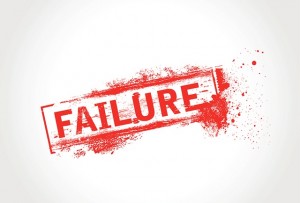
 Last week I was at the first edition of No Fail, No Gain, a conference about what the speakers learned from their failures, organized by GOTORO.
Last week I was at the first edition of No Fail, No Gain, a conference about what the speakers learned from their failures, organized by GOTORO.
I haven’t spoken about my failures during that conference; all I did was present GOTORO as an introduction, yet I had a few things I could have said. Indeed, I have failed, but I have learned from these failures!
Failure is simply the opportunity to begin again, this time more intelligently. HENRY FORD
What I have failed.
I have failed twice recently, firstly, my company, cross-roads, ran out of business in 2013 and secondly, my startup, mapromo.be, failed to attract customers and users, so I stopped the project (the company didn’t bankrupt). In both cases, I have learned a lot, and I’ll try to summarize a few main things in this post.
Lessons learned from the bankruptcy of my company.
- Talk, Talk, Talk: when things are going wrong one tends to communicate less. This is a big mistake. Communicating about the issues in the company later helped me get an outside look. It was too late to save the company when I started talking about it, but it helped control the damage.
- I should have let go the company earlier, by not doing so I have lost more of my own money than what I should have. Why didn’t I decide faster? I was way to optimistic and taking in account more that just the basic numbers. I’m not saying that one should not fight to get a company back on tracks, but one should also not be blinded by optimism.
- Get qualified advice. Of course, it costs some money, but it is worth all the value, especially when you are completely new to a situation.
- Don’t borrow money to pay debts. Doing this will only bring more debts
- Don’t put personal money in a company which is drowning, this will only make you lose your money.
- Look forward, not backward. It is important to understand what lead to a bad situation, but it is even more important to have a plan for the future. Prepare a 1, 3, 6 and 12 months plan. Re-evaluate very regularly.
- Hiring employees costs a lot of money, firing them too. Next time, I’ll go for freelancers as much as I can!
- Taking home problems is not good! It is hard to take a break when things are going bad, but is is necessary. Try to keep those problems at work so you can relax better at home and be more productive the next day.
- Don’t be ashamed of failing. What people might think about the failure of your company is not important, what is important is your attitude once you have failed. Getting back on tracks is the most important
- There is no silver bullet, if there was, no companies would ever fail.
Seeing almost 10 years of work going down the drain in less that a year is hard, but learning from it is the best thing one can do. I was lucky I had my family to rely on in these difficult moments, and I will never thank enough my accountant (st) who did so much more than crunching the numbers.
Lessons learned from a failed startup attempt.
- Pre launch studies are good, but, don’t trust them too much. Our initial survey looked really good, more than 75% of our potential customers we be willing to pay us for our service. When the service was there, those 75% were gone!
- Get to the market as fast as possible. It took us almost a year before we released our first version. why? We spent way too much time on details irrelevant to the customers.
- Spend less on code, more on marketing. We have coded way too much, marketed way too little.
- Be dedicated! I was dealing with too many things at the same time. One of them was my other company not going well (see upper), which means I wasn’t 100% focused on the startup. Even with a great team you trust, all your attention must be on your startup.
- Understand customers. We had a great tool, but customers weren’t using it even though they were paying for it. Why? I don’t know, I never asked them: HUGE mistake.
- Stop looking for money at investors, find customers first. I have spent a lot of time an energy pitching to investors for money. If I had used all that time to find customers, who knows how it would have ended.
- Get one or more co-founder(s). I am a technical guy, what was I thinking doing this on my own? Well, I understood that I wasn’t going to be able to do everything on my own, so I hired people. Mistake! Getting co-founders on board would have been a smarter idea.
- Get the startup in an incubator program. There were none at the time in my city, but there were in other cities, no excuse!
- Start selling in a large city. I started in a small one. For what reason? It was close to home. Stupid idea.
- Focus on growth, not product/service improvement.
I learned all these things the hard way! If I had read some literature before I got started, I would have avoided a lot of these mistakes.
I would suggest 2 books at least:
- Lean Startup by Eric Ries: http://theleanstartup.com/
- The Art of the Start 2.0 by Guy Kawasaki: http://guykawasaki.com/books/the-art-of-the-start/
I’m not saying that these books contain miracle recipes for launching a startup, but they learned me a lot of things I wish I knew before getting started!